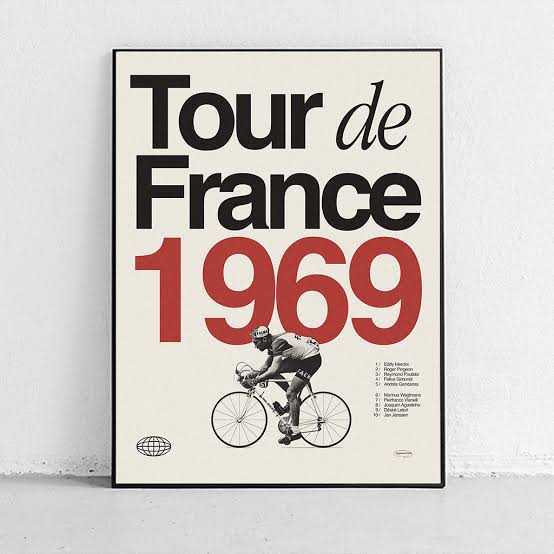
Eddy Merckx’s victory in the 1969 Tour de France was not just a triumph of physical endurance and skill; it was a declaration that the impossible was within reach. At just 24 years old, the young Belgian’s performance during that edition of the race would come to be regarded as one of the greatest feats in cycling history, not just because of the victory itself, but because of the way he won. His dominance was so overwhelming, so complete, that it felt like the arrival of something entirely new in the sport. To truly appreciate the magnitude of that achievement, one needs to view it in the context of his age, the state of cycling at the time, and the forces that seemed to work against him.
Merckx’s win in 1969 was not an inevitable result; it was the beginning of a legend. But when we look at it now, through the lens of his subsequent career and unparalleled success, it can be easy to forget just how audacious it was. Merckx would go on to win five Tour de France titles, five monuments, and countless other races, earning the title of “The Greatest Cyclist of All Time.” But in 1969, he was still a relatively unknown talent—a rising star looking to prove that he could be more than just a one-day rider.
A Breakthrough for a Rising Star
Merckx’s entry into professional cycling in 1965 had already marked him as a rider to watch. He quickly made a name for himself by dominating classic races, securing five monuments and a World Championship. 
The victory itself was almost otherworldly. Merckx didn’t just win the race—he obliterated the competition. He finished more than 17 minutes ahead of his nearest rival, a margin that seemed unheard of in the fiercely competitive world of the Tour de France. This wasn’t merely a matter of edging out competitors by seconds or minutes—it was a complete dismantling of the opposition, both on the road and psychologically. Merckx’s approach to the Tour was ruthless and unrelenting, as he won multiple stages, including time trials, mountain stages, and flat sprints, exhibiting an all-around mastery of the sport.
Behind the Triumph: A Dark Cloud of Doping Controversy
But the triumph wasn’t without its shadows. Merckx’s 1969 Tour came in the wake of a scandal that had marred his victory in the Giro d’Italia earlier that year. He had been expelled from the race after a controversial urine test showed traces of doping. The public spectacle of a tearful Merckx being escorted out of the Giro by Italian authorities created a powerful image of a champion being unjustly punished. His vehement protests of a conspiracy against him—suggesting the Italians wanted one of their own to win—were met with skepticism, but they would remain a painful part of his legacy.
Merckx’s suspension was overturned after two weeks, and he was allowed to race in the Tour, but the controversy never fully dissipated. Throughout the 1969 Tour, he was plagued by the nagging thought that the public, especially in Belgium, might see him as a cheat. The Belgian press, which had been fixated on every aspect of his career, was full of commentary on the scandal, to the point where it was said that only the Kennedy assassination had generated as many words in the Belgian media.
Merckx and Belgian Cycling: A Cultural Icon
To understand the significance of Merckx’s achievement, one must also grasp the centrality of cycling in Belgian culture, particularly in Flanders. At the time, cycling was a sport that had deep roots in the working-class regions of the country, especially in the Dutch-speaking Flanders. Cycling was more than just a sport; it was a form of identity, a source of pride for a community that was often marginalized in the broader national context.
Merckx became the embodiment of this identity—a working-class hero who rose to international fame, not just for his athleticism but for his unwavering dedication to the sport. His success in the Tour de France was as much about national pride as it was about individual achievement. In a country where French was the language of government and the elite, the Dutch-speaking Flemish population saw in Merckx a symbol of their own power and potential. His victory was not just his own, but that of an entire community.
The Legacy of Merckx’s 1969 Tour
Looking back at Merckx’s 1969 Tour de France victory today, it’s clear that this was not just a step in a career, but a defining moment in the sport of cycling. The sheer dominance he exhibited—winning by a margin that still shocks the cycling world today—set a new standard for what was possible in the Tour de France and in cycling as a whole.
Merckx went on to achieve everything a cyclist could dream of: multiple Grand Tour victories, countless stage wins, and victories in every major one-day classic. But his 1969 Tour was the point at which he became more than a rider—it was the moment that solidified him as a force of nature, a symbol of what could be achieved when an athlete reached the zenith of their potential.
Merckx’s triumph was a mixture of youth, brilliance, and raw determination. In the same way Usain Bolt’s 9.69 seconds in Beijing or Maradona’s incredible goal against England captured the imagination of sports fans around the world, Merckx’s 1969 Tour de France victory became an iconic moment in the history of cycling. It was the beginning of a career that would redefine the sport, but more than that, it was a moment where Eddy Merckx announced to the world that greatness was not only possible—it was inevitable.
Leave a Reply